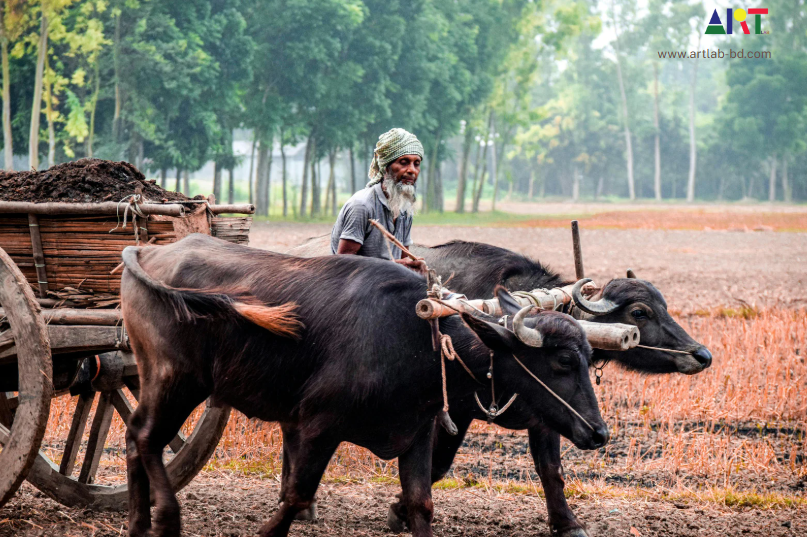
In an era where urbanization and technological advancements dominate our daily lives, the rural landscapes of Bangladesh remain a testament to resilience, tradition, and harmony with nature. At ART Lab, we strive to capture the essence of these landscapes, telling the untold stories of the people who work tirelessly to sustain the heartbeat of our agricultural heritage.
The Farmer’s Journey: A Story of Dedication and Perseverance
One of the most iconic sights in rural Bangladesh is that of a farmer guiding his buffaloes through the fields. This simple yet profound image represents generations of knowledge passed down through families, where farming is more than just a livelihood—it is a way of life. From plowing fields at dawn to harvesting crops under the golden sun, these farmers embody hard work, patience, and an unbreakable connection to the land.
In our latest visual capture, we see a farmer leading his buffalo cart through a misty morning. The earthy scent of freshly plowed soil, the rhythmic sound of hooves on the ground, and the peaceful surroundings paint a picture of life that remains deeply rooted in tradition. Despite the challenges posed by modernization, climate change, and shifting economic landscapes, these farmers continue to preserve their way of life with dignity and dedication.
The Role of Traditional Farming in Today’s World
As the world moves towards industrialized agriculture, traditional farming practices hold an important place in ensuring sustainability. Many small-scale farmers in Bangladesh practice organic farming techniques that align with nature, relying on seasonal knowledge and time-tested methods. The use of buffaloes for plowing, for example, reduces carbon footprints compared to modern mechanized farming.
Additionally, traditional farming supports local economies by creating employment opportunities and maintaining the cultural fabric of rural communities. The interdependence of farmers, livestock, and the environment forms a delicate balance that has sustained civilizations for centuries.
Challenges Faced by Rural Farmers
While traditional farming carries historical and ecological significance, it is not without its challenges. Many farmers struggle with limited access to resources such as quality seeds, irrigation systems, and financial support. Climate change further exacerbates their difficulties, bringing unpredictable weather patterns that can devastate crops and livelihoods.
Moreover, younger generations are increasingly moving to urban areas in search of better economic opportunities, leading to a decline in traditional farming practices. This shift raises an important question: how can we preserve and modernize these practices to ensure their relevance in today’s fast-paced world?
Preserving Bangladesh’s Agricultural Heritage
At ART Lab, we believe in the power of storytelling to highlight the significance of traditional farming and the people who dedicate their lives to it. By documenting these moments through photography and visual narratives, we hope to foster appreciation and awareness about the role of rural communities in sustaining Bangladesh’s agricultural heritage.
Supporting local farmers, promoting sustainable agriculture, and advocating for policies that uplift rural communities are some of the ways we can contribute to preserving this way of life. Investing in education, technology, and infrastructure while respecting traditional knowledge can create a balanced approach to agricultural development.
A Call to Appreciate and Support
The image of a farmer and his buffaloes is more than just a picturesque scene—it is a reminder of perseverance, simplicity, and the interconnectedness of humans and nature. As we move forward in a rapidly evolving world, let us take a moment to appreciate and support those who continue to cultivate the land with dedication.
Do you have a story or experience related to rural life and traditional farming? Share your thoughts in the comments or join the conversation on our social media platforms.
ART Lab – Capturing Culture, One Frame at a Time.

